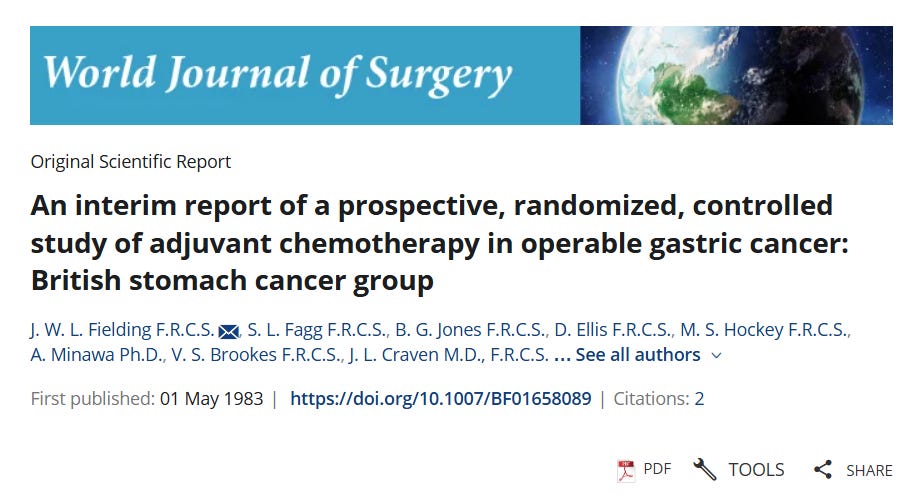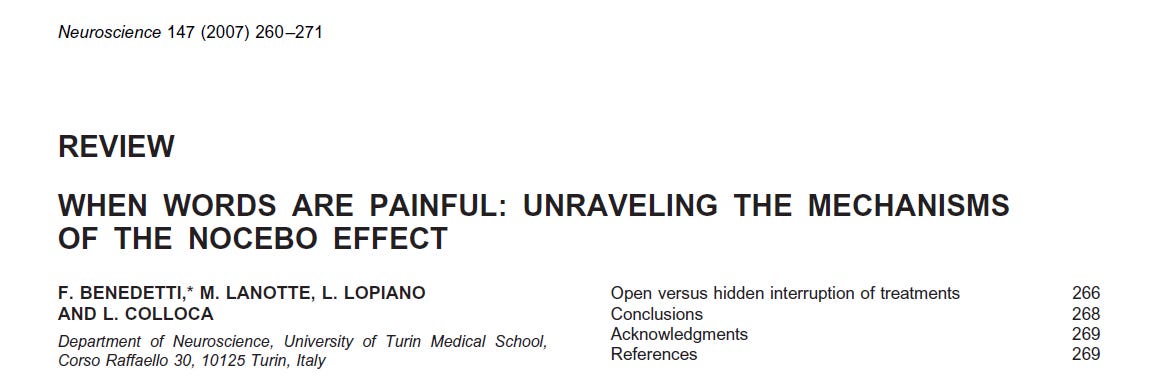Further evidence of the power of the nocebo effect.
By way of introduction:
The above is from this article, which I recommend you read:
This is just a very short article outlining a further striking example of the nocebo effect in action.
I read about this in Daniel Roytas’s book Can You Catch a Cold which I highly recommend.
This paper, cited by Daniel, reports on a randomised trial of 411 subjects who had undergone surgical resection for gastric cancer.
The aim was to find out if chemotherapy after surgery improved outcomes.
They were randomly divided into 3 groups, one of which was treated (after surgery) with saline (ie placebo) infusion, whereas the other 2 groups received different regimens both of which included chemotherapy drugs.
A PDF of the paper is here:
The outcome of the trial (which was that the chemotherapy made no difference) isn’t what is of interest here, and it is in any event of limited relevance today because of the changes in treatment which we have seen in the decades since this study.
What Daniel noted in his book was this table:
Treatment A was placebo, so what the above says is that:
over one third of subjects on placebo had what is described as drug-related nausea
over one fifth actually vomited
nearly one third had alopecia
Some might argue that this was as a result of the illness or surgery, but this holds no water because:
The authors don’t mention that possibility.
You wouldn’t necessarily expect it from surgery anyway.
The study follows subjects over a relatively extended period, ie months / years rather than weeks.
The toxicity is clearly described in terms of being “associated with treatments” and is called “drug-related”.
Of course, it would have been quite easy to distinguish nausea which occurred generally as a result of surgery or illness over a period of time from that linked temporally to the administration of the drugs.
So this is, it seems, clear evidence of causation of nausea and vomiting from the mere expectation of it by the subjects, who of course thought they had a 2/3 chance of receiving chemotherapy, which they would expect to cause nausea and vomiting.
Interestingly, whilst it is perhaps understandable (though no less notable) that nausea would be induced psychologically, it is interesting to note that over a fifth of subjects suffered from alopecia, to which you might NOT have thought they would be susceptible except via some direct pharmacological mode of action.
This just reinforces my belief that we have truly underestimated - and do not understand - the potential for psychological factors to manifest in real symptoms.
In that regard, the below paper attempts to fill at least some of those gaps, though is more focused on pain than other symptoms.







As you know I've been looking into the placebo and nocebo effects for years and it never fails to amaze me how important our beliefs are for our health and living a good life too. I've not read this book or seen this particular study before, but I'm not surprised. Thank you for sharing more on this very important topic.
Good article. Read The book:Placebo by Dr. Joe Dispenza.
When you understand how powerful this effect truly is you understand how one can take a natural occurence(cold/flu), layer on the power of suggestion(nocebo) iced with a thick layer of fear and bingo, a pandemic is born.